1-Dropbox_Permissions Scan Job
The 1-Dropbox_Permissions Scan job collects data from the Dropbox environment on access rights, sharing policies, configurations, and content.
CAUTION: This job should not be run if running sensitive data scans against the Dropbox Business environment.
Queries for the 1-Dropbox_Permissions Scan Job
The 1-Dropbox_Permissions Scan job has been preconfigured to run with the default settings with the category of Dropbox Access.

The query for the 1-Dropbox_Permissions Scan job is:
- Dropbox Access – Collects the data on access rights, sharing policies, configurations, and content
Configure the Dropbox Access Query
Follow the steps to either generate the access token needed for the Connection Profile (only done prior to first execution) or to set any desired customizations.
Step 1 – Navigate to the Jobs > Dropbox > 0.Collection > 1-Dropbox_Permissions Scan > Configure node and select Queries.
Step 2 – In the Query Selection view, click Query Properties to open the Query Properties window.
Step 3 – Select the Data Source tab, and click Configure. The Dropbox Access Auditor Data Collector Wizard opens.
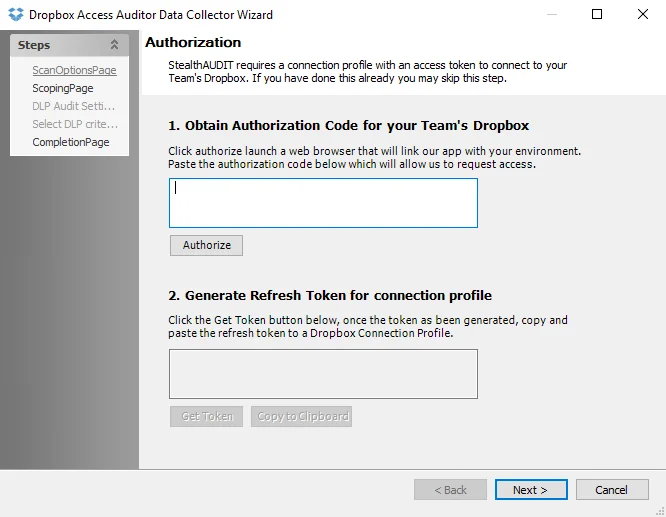
Step 4 – T Use the Scan Options page ito generate the access token prior to the first execution of the job group.
- Remember to copy the access token, either from the textbox or using the Copy to Clipboard button, and use it in the Connection Profile assigned to the Dropbox Solution. Once the access token has been generated and copied, if no customizations are to be made, click Cancel to close the Dropbox Access Auditor Data Collector wizard.
- See the DropboxAccess: Scan Options topic for full instructions on generating the access token
Step 5 – If query customizations are desired, click Next to continue.
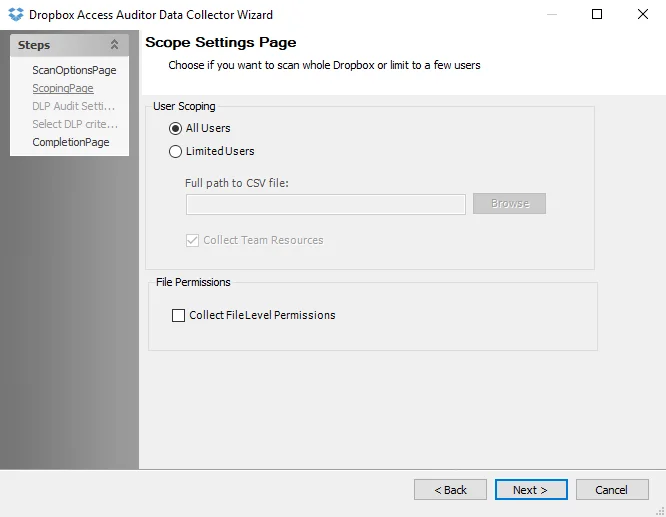
Step 6 – On the Scoping page, select whether to scan All Users or Limited Users. If Limited Users is selected, browse to a CSV file with one email address per row for the desired users. In the File Permissions section, select the Collect File Level Permissions checkbox to collect permissions at the file level. When finished with this page, click Next.
Step 7 – On the Summary page, click Finish to save any setting modifications or click Cancel if no changes were made. Then click OK to close the Query Properties window.
If changes were made, the 1-Dropbox_Permissions Scan job has now been customized.
1-Dropbox_SDD Scan Job
The 1-Dropbox_SDD Scan job collects data from the Dropbox environment on access rights, sharing policies, configurations, content and sensitive data.
Queries for the 1-Dropbox_SDD Scan Job
The 1-Dropbox_SDD Scan job has been preconfigured to run under the default settings within the category of Scan for Sensitive Content.

The query for the 1-Dropbox_SDD Scan job is:
- Sensitive Data Scan – Scans Dropbox for sensitive data
Configure the Sensitive Data Scan Query
Follow the steps to either generate the access token needed for the Connection Profile (only done prior to first execution) or to set any desired customizations.
Step 1 – Navigate to the Jobs > Dropbox > 0.Collection > 1-Dropbox_SDD Scan > Configure node and select Queries.
Step 2 – In the Query Selection view, click Query Properties to open the Query Properties window.
Step 3 – Select the Data Source tab, and click Configure. The Dropbox Access Auditor Data Collector Wizard opens.
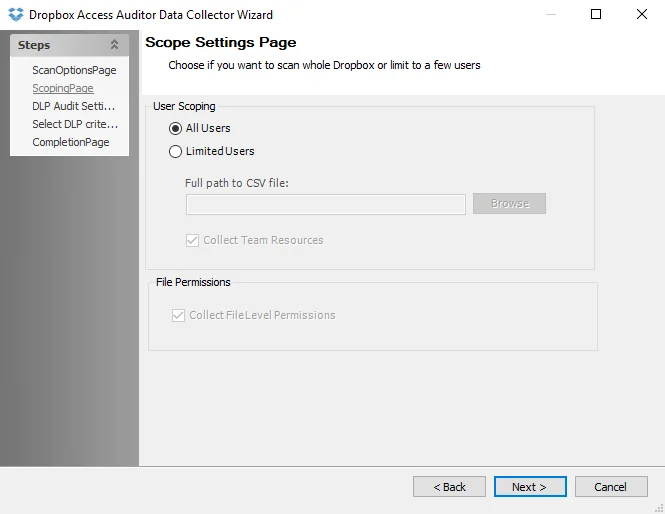
Step 4 – On the Scoping page, select whether to scan All Users or Limited Users. If Limited Users is selected, browse to a CSV file with one email address per row for the desired users. In the File Permissions section, select the Collect File Level Permissions checkbox to collect permissions at the file level. See the DropboxAccess: Scoping topic for additional information.
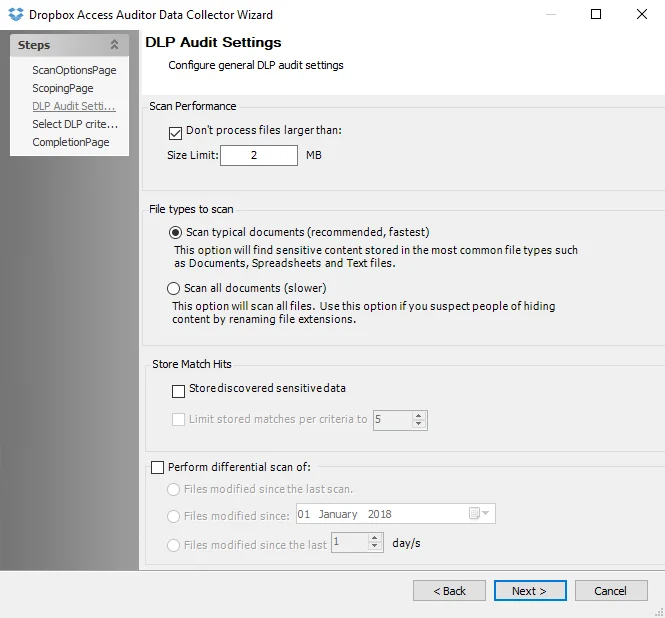
Step 5 – On theDLP Audit Settings page:
- Modify the maximum file size to be scanned
- Modify file types to be scanned
- Enable storing of discovered match hits
- Enable differential scanning
See the DropboxAccess: DLP Audit Settings topic for additional information.
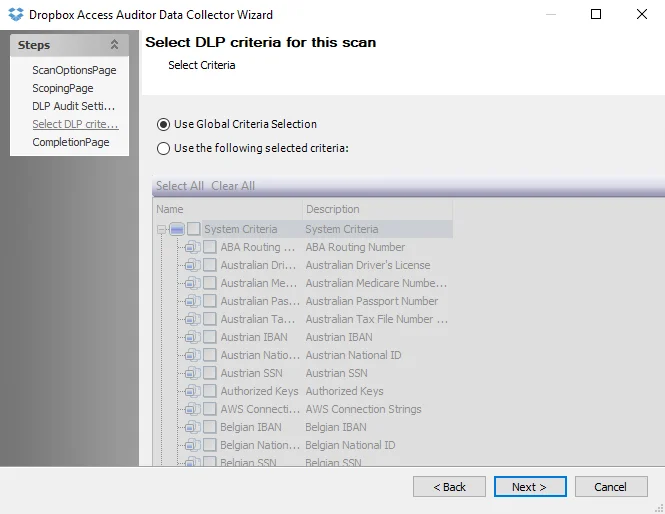
Step 6 – On the Select DLP Criteria for This Scan page , add or remove criteria as desired.
- (Optional) Create custom criteria with the Edit option. See the Sensitive Data Criteria Editor topic for additional information.
See the DropboxAccess: Select DLP Criteria topic for additional information.
Step 7 – On the Completion Page, click Finish to save any setting modifications or click Cancel if no changes were made. Then click OK to close the Query Properties window.
If changes were made, the 1-Dropbox_SDD Scan job has now been customized.
2-Dropbox_Permissions Bulk Import Job
The 2-Dropbox_Permissions Bulk Import job imports the data collected by the 1-Dropbox _Permissions Scan job to the Enterprise Auditor database for use by the analysis tasks.
CAUTION: This job should not be run if running sensitive data scans against the Dropbox Business environment.
Queries for the 2-Dropbox_Permissions Bulk Import Job
The 2-Dropbox_Permissions Bulk Import job has been preconfigured to run with the default settings with the category of Bulk Import Access Scan Results.

The query for the 2-Dropbox_Permissions Bulk Import job is:
- Dropbox Bulk Import – Imports data collected by the 1-Dropbox_Permissions Scan job to the Enterprise Auditor database
There are no customization options available for this job. The Summary page of the Dropbox Access Auditor Data Collector wizard can be viewed at the Jobs > Dropbox > 0.Collection > 2-Dropbox_Permissions Bulk Import > Configure > Queries node.
2-Dropbox_SDD Bulk Import Job
The 2-Dropbox_SDD Bulk Import job imports the data collected by the 1-Dropbox_SDD Scan job to the Enterprise Auditor database for use by the analysis tasks.
Queries for the 2-Dropbox_SDD Bulk Import Job
The 2-Dropbox_SDD Bulk Import Job has been preconfigured to run with the default settings with the category of Bulk Import Sensitive Content Scan.

The query for the 2-Dropbox_SDD Bulk Import job is:
- DropboxSDD Bulk Import – Imports data collected by the Dropbox 1-SDD Scan Job into the Enterprise Auditor database
There are no customization options available for this job. The Summary page of the Dropbox Access Auditor Data Collector wizard can be viewed at the Jobs > Dropbox > 0.Collection > 2-Dropbox_SDD Bulk Import > Configure > Queries node.
0.Collection Job Group
The Dropbox > 0.Collection job group scans the targeted Dropbox site using the DropboxAccess Data Collector. The collected data is then available to other job groups in the Dropbox solution and the Access Information Center for analysis.
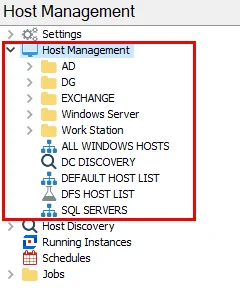
The 0.Collection job group is comprised of:
- 1-Dropbox_Permissions Scan Job – This job is responsible for scanning the target Dropbox site
- 1-Dropbox_SDD Scan Job – This job is responsible for scanning sensitive data in the target Dropbox site. The Sensitive Data Discovery Add-On is required to run this job. The Dropbox sensitive data Discovery Reports in the Access Information Center are also populated by this data. See the Resource Audits Overview topic in the Netwrix Access Information Center Documentation for additional information.
- 2-Dropbox_Permissions Bulk Import Job – This job is responsible for importing the collected data into the Enterprise Auditor database
- 2-Dropbox_SDD Bulk Import Job – This job is responsible for importing the collected sensitive data into the Enterprise Auditor database. The Sensitive Data Discovery Add-On is required to run this job. The Dropbox sensitive data Discovery Reports in the Access Information Center are also populated by this data. See the Resource Audits Overview topic in the Netwrix Access Information Center Documentation for additional information.
The relationship between the scan and bulk import jobs requires the following considerations:
- A scan job executed from an Enterprise Auditor Console must be followed by the corresponding bulk import job from the same Enterprise Auditor Console version
- Two scan jobs processing the same information, for example two 1-Dropbox_Permissions Scan jobs, cannot be executed consecutively against the same target host. The corresponding bulk import job, for example 2-Dropbox_Permissions Bulk Import job, must be executed in between.
- For the Dropbox Solution, the bulk import jobs require the same connection profile as used in the corresponding scan jobs
RECOMMENDED: When running the sensitive data jobs, disable the permissions jobs, and vice versa.
Remember, prior to running the Dropbox Solution for the first time, it is necessary to generate an access token to be used in the Connection Profile. This only needs to be done once. See the Configure the Dropbox Access Query topic for additional information.
1.Access > Dropbox_Access Job
The Dropbox_Access job provides insight into effective access to resources within the targeted Dropbox environment, specifically highlighting inactive access rights that can be revoked. It is dependent on data collected by the 0.Collection job group. This job processes analysis tasks and generates reports.
The Dropbox_Access job is located in the 1.Access job group.
Analysis Tasks for the Dropbox_Access Job
View the analysis tasks by navigating to the Jobs > Dropbox > 1.Access > Dro pbox_Access > Configure node and select Analysis.
CAUTION: Do not modify or deselect the selected analysis tasks. The analysis tasks are preconfigured for this job.
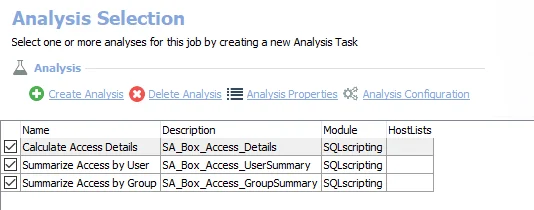
- Get access details – Creates the SA_Dropbox_Access_Details table accessible under the job’s Results node
- Summarize access details – Creates the SA_Dropbox_Access_Summary table accessible under the job’s Results node
In addition to the tables created by the analysis tasks which display effective access to resources, the Dropbox_Access job produces the following pre-configured reports.
| Report | Description | Default Tags | Report Elements |
|---|---|---|---|
| Effective Access | This report shows effective access for all files in Dropbox. | GDPR SOX HIPAA PCI-DSS GLBA ITAR FERPA FISMA ISO27001 | This report is comprised of three elements: - Stacked Bar Chart – Displays access by team - Table – Provides summary of database access - Table – Provides details on database access |
| Inactive Access | This report identifies instances of inactive access in Dropbox. Inactive access to a shared folder occurs when a user has left the shared folder, but can still rejoin it. | None | This report is comprised of two elements: - Bar Chart – Displays inactive access by team - Table – Provides details on inactive access |
4.Content > Dropbox_Content Job
The Dropbox_Content job provides insight into the type, size, and age of the content within the targeted Dropbox environment. It is dependent on data collected by the 0.Collection job group. This job processes analysis tasks and generates reports.
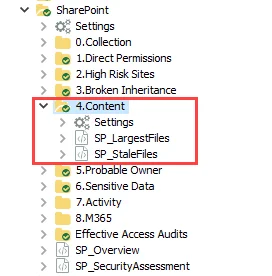
The Dropbox_Content job is located in the 4.Content job group.
Parameter Configuration
The Configuration section on a Job's overview page allows you to easily modify any customizable parameters used by analysis tasks in the job. See the Parameter Configuration topic for instructions on how to edit parameters on a job overview page.
The Dropbox_Content job has the following customizable parameter:
- Days since File Modification before a file is considered stale
See the Customizable Analysis Tasks for the Dropbox_Content Job topic for additional information.
Analysis Tasks for the Dropbox_Content Job
View the analysis tasks by navigating to the Jobs > Dropbox > 4.Content > Dropbox_Content > Configure node and select Analysis.
CAUTION: Most of the analysis tasks should not be modified or deselected. The analysis tasks are preconfigured for this job.
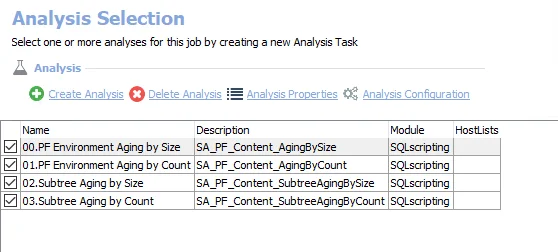
-
Summarizes content by mimetype, classification – Creates an interim processing table in the database for use by downstream analysis and report generation
-
Determines stale data by owner:
- By default, a stale file has not been modified in the past 365 days. You can modify this analysis task to edit this number of days. See the Customizable Analysis Tasks for the Dropbox_Content Job topic for additional information.
- Creates an interim processing table in the database for use by downstream analysis and report generation
- Creates the SA_Dropbox_StaleData_OwnerSummary table accessible under the job’s Results node
In addition to the tables created by the analysis tasks which display content details, the Dropbox_Content job produces the following pre-configured reports.
| Report | Description | Default Tags | Report Elements |
|---|---|---|---|
| Content By Type | This report breaks down Dropbox content by mimetype and classification. | None | This report is comprised of two elements: - Pie Chart – Displays content types by size - Table – Provides details on all content |
| Stale Content | This report identifies stale content within Dropbox by owner. | Stale Data | This report is comprised of three elements: - Stacked Bar Chart – Displays data ownership - Table – Provides summary of content - Table – Provides details on owners |
Customizable Analysis Tasks for the Dropbox_Content Job
The time frame used to define stale content is set by default to 365 days. This can be modified within the Determines stale data by owner analysis task. The customizable parameter feature enables you to easily set this value.
| Customizable Parameter Name | Default Value | Value Indicates |
|---|---|---|
| @days_since_modified | 365 | How many days since the last modified day in order for a file to be considered stale content. |
The parameter can be customized and is listed in a section at the bottom of the SQL Script Editor. See the Configure the Customizable Parameters in an Analysis Task topic for additional information.
3.Group Membership > Dropbox_GroupMembership Job
The Dropbox_GroupMembership job provides insight into group membership within the targeted Dropbox environment, highlighting the largest groups. It is dependent on data collected by the 0.Collection job group. This job processes analysis tasks and generates a report.
The Dropbox_GroupMembership job is located in the 3.Group Membership job group.
Analysis Tasks for the Dropbox_GroupMembership Job
View the analysis tasks by navigating to the Jobs > Dropbox > 3.Group Membership > Dropbox_GroupMembership > Configure node and select Analysis.
CAUTION: Do not modify or deselect the selected analysis tasks. The analysis tasks are preconfigured for this job.
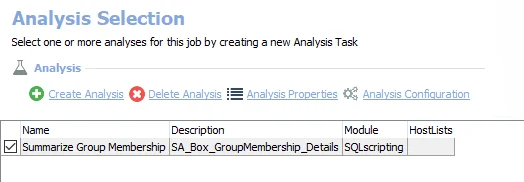
- Get group membership details – Creates an interim processing table in the database for use by downstream analysis and report generation
- Summarize group membership by team – Creates the SA_Dropbox_GroupMembership_Summary table accessible under the job’s Results node
In addition to the tables created by the analysis tasks which display group membership details, the Dropbox_GroupMembership job produces the following pre-configured report.
| Report | Description | Default Tags | Report Elements |
|---|---|---|---|
| Group Membership | This report lists membership and owners for all groups within Dropbox. | None | This report is comprised of three elements: - Bar Chart – Displays largest groups - Table – Provides summary of group membership - Table – Provides details on membership |
5.Sensitive Data > Dropbox_SensitiveData Job
The Dropbox_SensitiveData job identifies locations within Dropbox where sensitive data is present. It analyzes sensitive data collected and imported by the 0.Collection job group, specifically data discovered by the Dropbox SDD jobs. The generated reports give visibility into the types of sensitive data found, where it exists, who has access to it, and the sharing policies configured on it.
The Dropbox_SensitiveData job is located in the 5.Sensitive Data job group.
Analysis Tasks for the Dropbox_SensitiveData Job
View the analysis tasks by navigating to the Jobs > Dropbox > 5.Sensitive Data > Dropbox_SensitiveData > Configure node and select Analysis.
CAUTION: Do not modify or deselect the selected analysis tasks. The analysis tasks are preconfigured for this job.
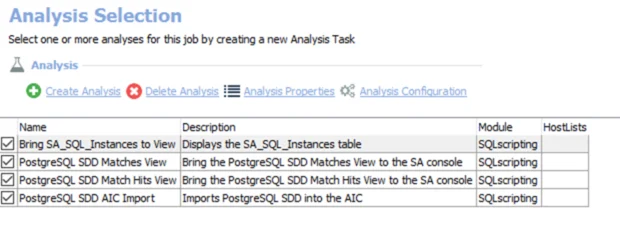
-
- Enterprise Summary – Creates the SA_Dropbox_SensitiveData_EnterpriseSummary table accessible under the job’s Results node
-
- Folder Details – Creates the SADropbox SensitiveData_FolderDetails table accessible under the job’s Results node
-
- Folder Summary – Creates the SADropbox SensitiveData_FolderSummary table accessible under the job’s Results node
-
- Permission Details – Creates the SADropbox SensitiveData_PermissionDetails table accessible under the job’s Results node
-
- Permission Summary – Creates the SADropbox SensitiveData_PermissionSummary table accessible under the job’s Results node
In addition to the tables created by the analysis tasks which display effective access to resources, the Dropbox_SensitiveData job produces the following pre-configured reports.
| Report | Description | Default Tags | Report Elements |
|---|---|---|---|
| Enterprise Summary | This report identifies the type and amount of sensitive content found on Dropbox. | None | This report is comprised of two elements: - Pie Chart – Displays criteria summary by match count - Table – Provides criteria summary by match count |
| Folder Details | This report identifies the location of sensitive data, and flags whether or not this data is accessible through open access. | None | This report is comprised of three elements: - Bar Chart – Displays top sensitive folders by file count - Table – Provides top sensitive folders by file count - Table – Provides top sensitive folder details by match count |
| Sensitive Data Permissions | This report identifies the sensitive data locations and associated permissions. | None | This report is comprised of three elements: - Bar Chart – Displays sensitive data permission summary by file count - Table – Provides sensitive data permission summary by file count - Table – Provides sensitive data permissions by match count |
2.Sharing > Dropbox_Sharing Job
The Dropbox_Sharing job provides insight into the sharing of resources within the targeted Dropbox environment. It is dependent on data collected by the 0.Collection job group. This job processes analysis tasks and generates a report on which resources are being shared and under which policy the sharing occurs. Best practices often dictate that these resources should be carefully monitored due to the amount of access to the data. If these resources contain privileged data, the access should be reevaluated or the sensitive resources relocated.
The Dropbox_Sharing job is located in the 2.Sharing job group.
Analysis Tasks for the Dropbox_Sharing Job
View the analysis tasks by navigating to the Jobs > Dropbox > 2.Sharing > Dropbox_Sharing > Configure node and select Analysis.
CAUTION: Do not modify or deselect the selected analysis tasks. The analysis tasks are preconfigured for this job.
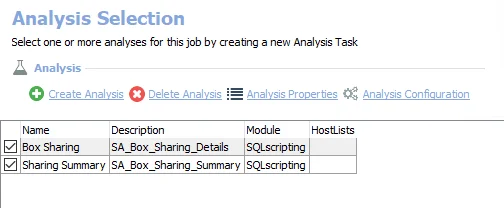
- Get shared folder details – Creates the SA_Dropbox_Sharing_Details table accessible under the job’s Results node
- Summarize sharing by team – Creates the SA_Dropbox_Sharing_TeamSummary table accessible under the job’s Results node
In addition to the tables created by the analysis tasks which display details on shared resources, the Dropbox_Sharing job produces the following pre-configured report.
| Report | Description | Default Tags | Report Elements |
|---|---|---|---|
| Shared Files and Folders | This report lists all shares by team, and provides sharing policy and owner information. | None | This report is comprised of three elements: - Bar Chart – Displays shared folders by team - Table – Provides details on shared folders by team - Table – Provides details on shares |
Dropbox Solution
The Dropbox Solution is an auditing, compliance, and governance solution for Dropbox for Business. Key capabilities include effective access calculation, sensitive data discovery, file content inspection, inactive access and stale data identification, and entitlement collection for integration with Identity & Access Management (IAM) processes.
The Dropbox Solution is designed to offer an overview of an organization’s Dropbox environment by scanning the targeted Dropbox site. Key information includes:
- Effective access to Dropbox resources
- Outline of shared Dropbox resources
- Detailed Dropbox group membership
- Breakdown of Dropbox content by size, type, and owner
Dropbox can scan the contents of over 400 file types to discover which files contain sensitive data using the Sensitive Data Discovery Add-on.
Supported Platforms
- Dropbox
Requirements, Permissions, and Ports
See the Target Dropbox Requirements, Permissions, and Ports topic for additional information.
Sensitive Data Discovery Considerations
The Sensitive Data Discovery Add-On must be installed on the Enterprise Auditor Console server, which enables Sensitive Data criteria for scans. If running Sensitive Data Discovery (SDD) scans, it will be necessary to increase the minimum amount of RAM. Each thread requires a minimum of 2 additional GB of RAM per host. For example, if the job is configured to scan 8 hosts at a time , then an extra 16 GB of RAM are required (8x2=16).
NOTE: The Sensitive Data Discovery Add-on installation package installs the appropriate JDK (Java) version on the server. The JDK deployed is prepackaged and does not require any configuration; it has been preconfigured to work with Enterprise Auditor and should never be customized through Java. It will not conflict with other JDKs or Java Runtimes in the same environment.
Location
The Dropbox Solution requires a special Enterprise Auditor license. It can be installed from the Instant Job Wizard. Once it has been installed into the Jobs tree, navigate to the solution: Jobs > Dropbox.
The 0.Collection job group collects the data. The other job groups run analyses on the collected data and generate reports.
Job Groups
The Dropbox Solution offers an overview of an organization’s Dropbox environment by scanning the targeted Dropbox site. It is comprised of jobs which collect, analyze, and report on data. The data collection is conducted by the DropboxAccess Data Collector. See the Standard Reference Tables & Views for the DropboxAccess Data Collector topic for database table information.
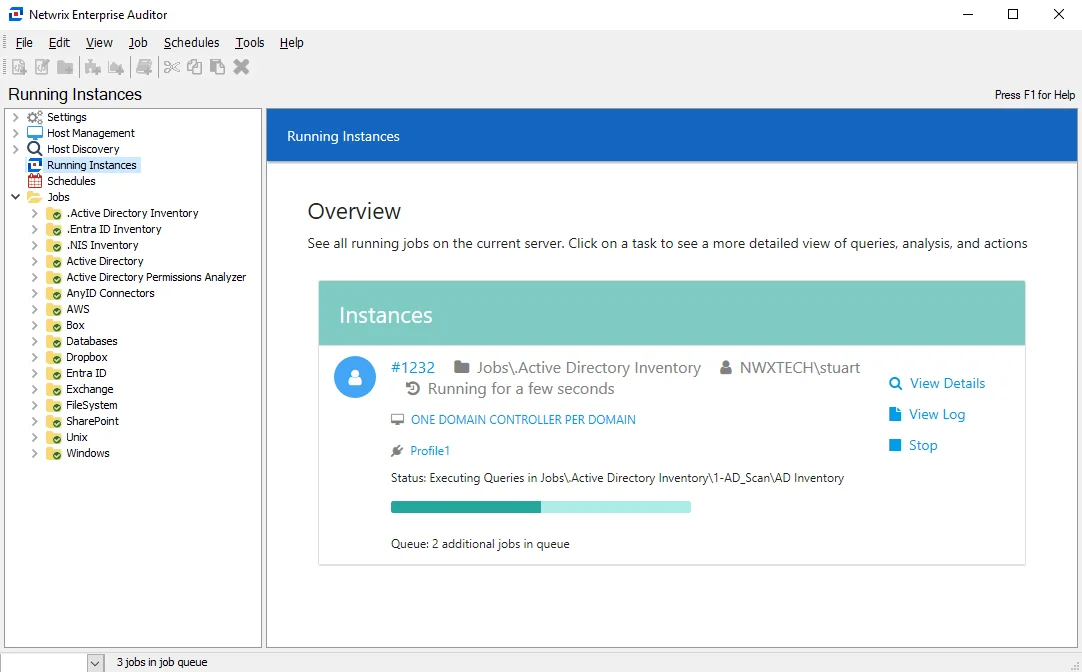
The following jobs comprise the Dropbox Solution:
- 0.Collection Job Group – Scans the targeted Dropbox site and generates the standard reference tables and views
- 1.Access > Dropbox_Access Job – Reports on effective access to Dropbox resources in the targeted environment
- 2.Sharing > Dropbox_Sharing Job – Reports on the sharing of Dropbox resources in the targeted environment
- 3.Group Membership > Dropbox_GroupMembership Job – Reports on Dropbox group membership in the targeted environment
- 4.Content > Dropbox_Content Job – Reports on Dropbox content by size, type, and owner in the targeted environment
- 5.Sensitive Data > Dropbox_SensitiveData Job – Reports on sensitive data in the targeted Dropbox site
Recommended Configurations for the Dropbox Solution
The Dropbox Solution requires the host list to be assigned and the Connection Profile configured before job execution. Once these are assigned to the job group, it can be run directly or scheduled.
Targeted Hosts
The Dropbox solution has been configured to inherit the host list assignment from the collection job group level.
The host list assignment should be assigned under the Dropbox > 0.Collection > Settings > Host List Assignment node. Select the Local host option.
Connection Profile
The DropboxAccess Data Collector requires a specific set of permissions to generate an access token which is used to configure the Connection Profile for Dropbox. The access token is generated in the Dropbox Access Auditor Data Collector Wizard on the Scan Options page (accessed through the 1-Dropbox_Permissions Scan job’s Queries node). The access token only needs to be generated once, prior to running the job group for the first time. Then it is used as the credential in the Connection Profile. See the DropboxAccess: Scan Options topic for additional information.
The Dropbox solution has been configured to inherit the Connection Profile from the collection job group level. The Connection Profile should be assigned under the Dropbox > 0.Collection > Settings > Connection node. It is set to Use the Default Profile, as configured at the global settings level. However, since this may not be the Connection Profile with the necessary permissions for Dropbox, select the Select one of the following user defined profiles option and select the appropriate Connection Profile from the drop-down menu. See the Custom Dropbox Connection Profile & Host List topic for additional information on configuring the Dropbox credential. The Dropbox bulk import jobs requires the same connection profile as used in the corresponding Dropbox scan jobs
See the Connection topic for additional information on creating Connection Profiles.
Schedule Frequency
The Dropbox solution can be scheduled to run as desired.
History Retention
Not supported and should be turned off.
Multi Console Support
Not supported.
Run Order
The 0.Collection jobs must be run first and in order. Run the 1-Dropbox_Permissions Scan job and then the 2-Dropbox_Permissions Bulk Import job. For the sensitive data jobs, run the 1-Dropbox_SDD Scan job and then the 2-Dropbox_SDD Bulk Import job.
RECOMMENDED: When running the sensitive data jobs, disable the permissions jobs, and vice versa.
After running the 0.Collection jobs, the other Dropbox solution job groups can be run in any order. Best practice is to run at the solution level.
Query Configuration
This solution can be run with the default query configurations. The Scoping page of the Dropbox Access Auditor Data Collector Wizard can be customized to target specific user accounts. See the DropboxAccess: Scoping topic for additional information.
Analysis Configuration
This solution should be run with the default analysis configuration.
CAUTION: Do not modify or deselect the selected analysis tasks. The analysis tasks are preconfigured for this solution.
Though the analysis tasks should not be deselected the time frame used to define staleness can be modified:
-
Stale content set to default of 365 days
- Configured within the 4.Content > Dropbox_Content job
- Determines stale data by owner analysis task
- See the 4.Content > Dropbox_Content Job topic for additional information
Additional Consideration
The jobs contained in the solution use custom SQL scripts to render views on collected data. SQL views are used to populate report element tables and graphs. Changing or modifying the group, job, or table names will result in no data displayed within the Access Information Center.
Workflow
The following is the recommended workflow:
Step 1 – Run the 1-Dropbox_Permissions Scan job (for sensitive data, run the 1-Dropbox_SDD Scan job).
Step 2 – Run the 2-Dropbox_Permissions Bulk Import job (for sensitive data, run the 2-Dropbox_SDD Bulk Import job).
Step 3 – Run the desired corresponding analysis and reporting sub-job groups.
Remember, prior to running the Dropbox solution for the first time, it is necessary to generate an access token to be used in the Connection Profile. This only needs to be done once. See the Configure the Dropbox Access Query topic for additional information.